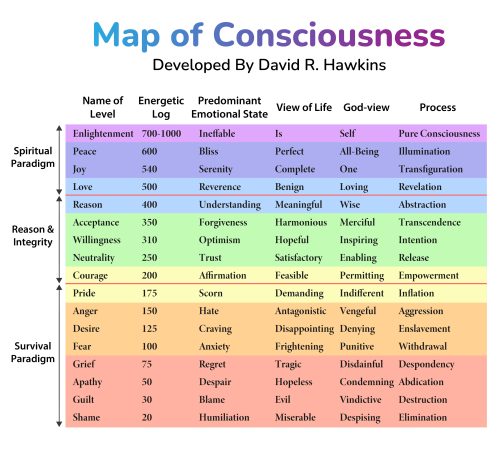Dr. David Hawkins created the consciousness scale, a framework for understanding human emotions and behaviour based on their energy levels and frequency. Each level on the scale represents a different state of consciousness, accompanied by various emotions, thoughts, and behaviours. The scale ranges from 0 to 1000, with 0 being the lowest level of consciousness and 1000 the highest. The levels are grouped into three main categories: lower, middle, and higher consciousness.
At lower consciousness levels (below 200), people tend to experience negative emotions such as fear,
anger, and shame. They may also exhibit behaviours that are harmful to themselves and others, such as
violence or addiction. At the middle consciousness levels (200-500), people experience more positive
emotions like love, joy, and peace. They are more likely to engage in behaviours that benefit themselves
and others, such as kind acts or creativity. At the highest consciousness levels (above 500), people
experience states of enlightenment, transcendence, and unity. They have access to profound insights and spiritual experiences that go beyond the limitations of the ego and the material world.

While Hawkins’ scale is, in my view, entirely accurate and makes a valuable connection between emotions and frequencies, there is a meaningful invitation, just as with any list that indicates a hierarchy. And that is from which perspective within us we view this and apply this valuable knowledge.
From the mind’s perspective, we look at this scale and frame it within a dimension of time and space where our personality makes a journey from lower to higher, transcending the lower frequencies to reach the higher dimensions. It is the never-ending effort of the seeker within the mind striving for a better version of themselves and the world. But what the mind cannot do, and perhaps does not want to, is that the dual and polarized nature of the mind in its striving for higher and better rejects everything that is lower and worse.
And it is precisely in this rejection that lies the crux of why things are still not truly better and higher, in
humans individually but also in humanity as a collective. The rejection of, judgment over, and surpassing of, in this case, the lower frequencies and emotions on Hawkins’ scale, is exactly the mechanism that causes them to gather more tension, become larger, and dive deeper into the shadow. It is precisely the rejection that causes the negative charge and effects of these frequencies, not the intrinsic properties of, for example, shame or guilt. We do not suffer from these frequencies but from our resistance to them, our judgment over them, and our futile effort to transcend them.
The other perspective available to us is to bring the conflict created by the mind’s polarized nature to the compassionate heart. Because the heart operates in unity and is capable of experiencing and embracing all facets of life with equanimity, the necessity to transcend or banish something from life falls away. The recognition here is that all frequencies and emotions on Hawkins’ scale are made of the same source energy. It simply indicates the diversity of life, the infinite bandwidth of experiences that occur between the lowest and highest frequencies, from the heaviest, darkest emotions to the most ecstatic and positive. Those who live from this place realize that there is nothing to transcend or conquer.
The only truly meaningful thing we have to do is to experience, embrace, and integrate the entire spectrum of what it means to be human. Not just the highest frequencies on Hawkins’ scale but also the very lowest and everything in between. This will truly enrich us as humans and make us more divine than any idea the mind has about what it means to be an enlightened human being. The key lies in the inclusion of everything life allows us to experience as humans, not in the banishment of that which we cannot or do not want to see as divine but truly is…
Learn more about Juno: www.junoburger.com



